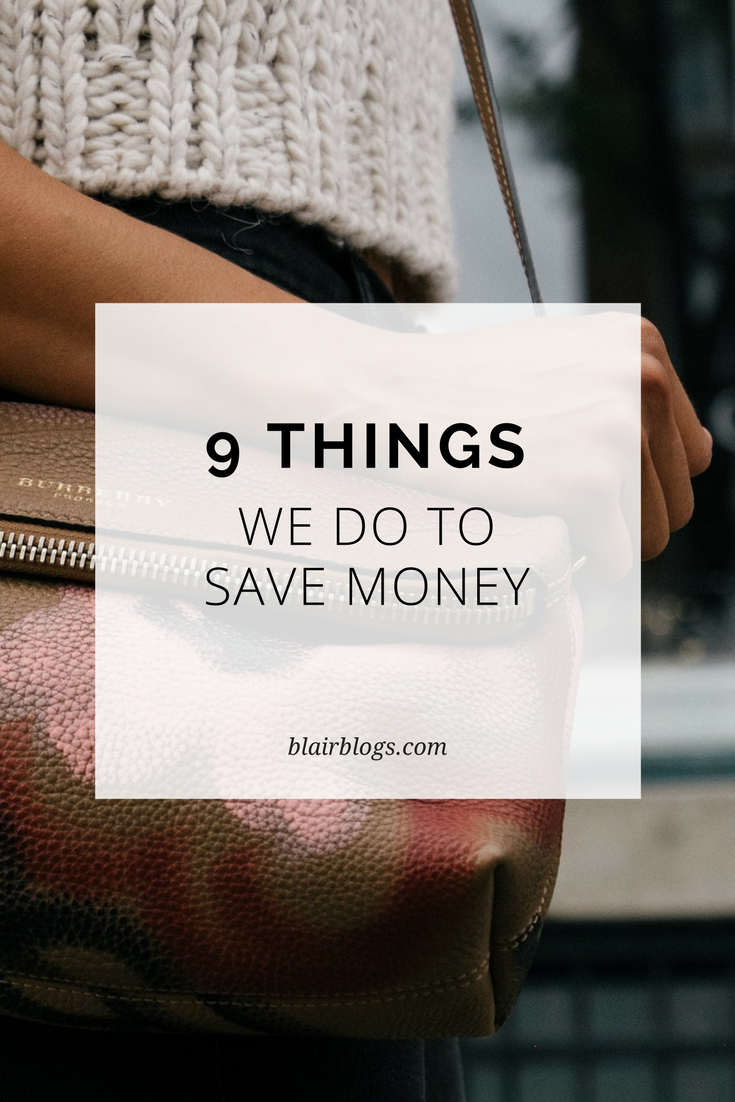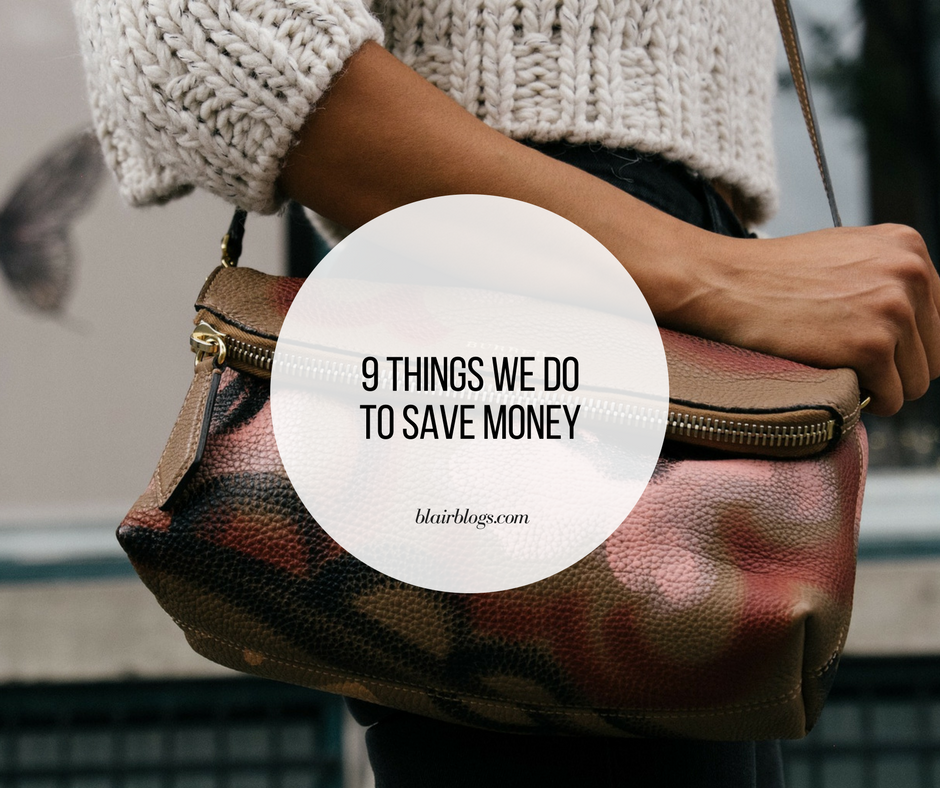Other posts in this series…
We’re all about simple living! Today I’m sharing nine things we do to save money; if you’re looking for more money-saving tips, check out 16 Things We DON’T Do to in Order to Save Money. Let’s jump right in!
1 | We buy items in bulk
Riley has a Sam’s Club membership through work, but there are many other places to purchase items in bulk like Costco, Amazon, and Boxed. We head to Sam’s Club once every six weeks or so to stock up on household essentials–toilet paper, dish detergent, toothpaste, and many other items we use every day are far less expensive when purchased in bulk. If you don’t have time or an interest in shopping at one of these stores, take a look at the cost per ounce in your local grocery store. Almost without exception, buying a larger size of the same product is cheaper in the end.
2 | We use the library to rent books, DVDs, and audiobooks
A few days ago, I shared a photo of my local library on Instagram. It’s nothing fancy, but I have greatly enjoyed checking out books and renting DVDs and audiobooks for free using my library card. I have a Kindle, and like to use it when I travel, but I definitely prefer a “real book” when I’m reading at home. Taking advantage of my local library instead of buying books on Amazon or even renting DVDs through Redbox adds up to big savings in the end.
3 | We give and save first
Each month, Riley and I give a percentage of our income and save another percentage. These two “expenses” are the most important in our budget, and having them in place forces us to be very mindful about the rest of our finances. It may seem counterintuitive, but giving and saving are financial priorities for us, so it’s important to put them first. By doing so, we save money in the long run.
With our financial priorities identified, and then needing to pay our mortgage and other bills, we can only spend what’s left. If we didn’t give and save first, we’d likely spend too much and be unable to give or save at all. It’s not always easy, but those things are priorities for us, so we work around them. Basically: identify your financial priorities and stick to them. Doing so will help you budget and save you from spending money on extraneous items so that you can honor your priorities.
4 | We make our own laundry detergent and cleaners
I was so fed up with buying pricey laundry detergent every month or two that I began to search for an effective, homemade alternative. I pulled up this recipe from One Good Thing by Jillee (a blog I have followed for years), bought the ingredients, and made it. (I omitted the scent crystals and used OxiClean Free.) It’s stored in a giant glass jar in my laundry room, and using two tablespoons a load, I think it’ll last us at least 12-18 months. Not to mention, it works great. I’ve stopped purchasing laundry spray because the ingredients in this detergent get stains out on their own (even makeup on my white towels).
Anyway, I estimated that I was spending roughly $182/year on laundry supplies. By making my own detergent for $30, I’m saving about $152/year. That adds up over time!
Similarly, I use Young Living’s Thieves Household Cleaner to clean every surface of my house (my floors, windows, countertops, bathrooms, showers–everything). I decant just a capful of the cleaner into a 16oz glass spray bottle, fill the rest with water, and I have a powerful, natural, effective, safe cleaner. I bought my bottle of cleaner for $22 in September, use it every day, and it’s still more than halfway full. Roughly a year of cleaning for $22–again, the savings add up. (Not to mention how it simplifies my life not having to buy separate bottles of window/wood/bathroom/countertop/floor cleaner.)
5 | We research + invest when purchasing something new
This way of thinking was instilled in me by my parents, and it’s something I will instill in my future children. Buying cheap junk because it’s cheap is rarely worth it in the long-run. When purchasing big ticket items, like technology or cars, or items that will get heavy use, like pots and pans, shoes, or handbags, it’s worth the time to do research and invest in the best option for our budget, not simply the cheapest. For us, this often means researching first, then saving up for several months, and then purchasing the item when we’re ready. Maintaining zero debt and buying things that will last requires patience, but it’s worth it!
We both have shoes that we’ve worn for 4+ years, I’ve carried my purse for 2+ years, our television is 4 years old, our pots and pans are 3 years old, etc, etc. We buy things that will last and we keep them for years!
6 | We take care of what we have
This point is tied greatly into number five. After investing in quality items, we take care of them! We keep things clean and well-maintained, we don’t leave things in places where they’ll get damaged or wear out, we buy cases and covers when we can, etc. An example of this “philosophy” are our kitchen knives. We have two high-end, high-quality knives that we use almost exclusively. Every time we use one, we wash the blade, dry it, and put it away. They never go in the dishwasher, and we sharpen the blades when they dull. They look as good as they day we got them! In this buy-cheap-and-throw-it-away culture, it’s nice to invest and take care of what we have.
7 | We invite friends over instead of going out
If friends invite us out to dinner at a restaurant, we’ll happily go and enjoy it! But, if we’re initiating a get-together, we often invite people over for dinner in our home. Both Riley and I love to cook, so we’re happy to put together a big meal and dessert for friends! Not only does dinner at home save money (it still costs something, of course, but is far less expensive than appetizers/dinner/dessert/drinks out), but I also think at-home dinner parties are more casual, comfortable, and tend to facilitate better conversations than restaurants.
8 | We communicate daily about finances
Riley and I communicate every day about our finances. It’s not a sensitive/taboo subject in our marriage because it’s such a frequent and casual topic of conversation. What bill needs to be paid, what expenses we have coming up, when I’m getting paid, when he’s getting paid, whose birthday is around the corner etc, etc. We have the same bank accounts, but even still, it’s important to us to stay on the exact same page. We usually have a brief, lighthearted, five-minute conversation over lunch, dinner, or before bed daily. Knowing that finances can be a huge point of contention in marriage has made us very intentional about having these casual conversations.
9 | We eat at home
I know I’ve mentioned this 1,000 times in other posts, but it’s critical. Eating out is so expensive! When Riley and I go out for dinner, we almost always spend at least $50+ when all is said and done–and that’s at a casual restaurant, not a formal one. That adds up fast…just four meals out totals $200+. We love date nights at restaurants, but save them for every once in a while, not every night. Instead, we eat at home the majority of the time and save hundreds of dollars.
// Those are all the things we do in order to save money! What about you?
Related: 16 Things We DON’T Do to in Order to Save Money and 4 Things We Splurge On
Thank you for reading! You can find me online on Facebook, Instagram, Pinterest, Twitter, and YouTube. If you’d like to be alerted whenever I publish a new post, you can follow me on Bloglovin’ or subscribe via email. Take a look at my Etsy shop where I sell tees, totes, sweatshirts, and pillow covers! Are you a blogger too? Check out my Blogger Mentorship Program.


I love all these points, and my husband and I live by most of them as well. I recently started making my own cleaning products in an effort to make the switch to more natural products, but I have had the worst luck with laundry detergent! The homemade stuff seems to fade my clothes so quickly! Have you noticed this? I’m hesitant to try out yet another recipe because, like point #6, I try to take the best care of what I have and don’t want to ruin any more clothes. I’m like you, though, and it pains me to spend so much money on Tide!
Oh, I’m so sorry that you’ve had bad luck with homemade laundry detergent. We haven’t noticed our clothes fading at all! Could be the detergent, could be a difference in our water–not sure! If the ingredients in the recipe I use are the same as the one you tried, I’d avoid it. I agree, it’s not worth ruining what you have. Anyway, thanks for reading and commenting! xoxo
Looks like we have very similar saving/spending habits! We use Foca detergent because it’s crazy cheap, it cleans well, and lasts a pretty long time. It is available in a big bag at the grocery store and like you, we store it in a large glass container. I used to DIY my detergent but got lazy. 😉 Also, just FYI, I read some things online about how we can’t actually make our own detergent and the ingredients in the DIYs are actually laundry boosters, not detergent agents. So you miiiight be shocked if you were to do a soak on your clean clothes and find the water turns dark. If it works for you, that’s great! I think it depends on how soiled your clothes normally get in the first place.
Another way I save money is use rebate apps like Ibotta, Checkout51, Ebates, and Walmart Savings Catcher. It’s how we get all of our extra spending money for Disney! 🙂 And finally, as a blogger you might be an Amazon Affiliate, and if you are, you can use your affiliate funds to buy gift cards for vacations. For example, I’m going to use mine to get a card for the T-Rex Cafe at Disney Springs so when we take our 7-year-old, the meal will be free. 🙂
Buying good quality things that will last is something I’ve had to learn. I used to gravitate towards the cheaper things but that’s really not saving money in the long run. When I got married last year, my husband and I used the giftcards we received to invest in some good quality kitchen utensils (saucepans, knives, frying pans). We hope to have them for many more years to come.
Less expensive items are so tempting, aren’t they? But I agree, higher quality (and higher priced) items are worth it in the long run. We also have a kitchen with high quality tools and utensils and feel they’re well worth the extra dollars we paid for them. Thanks for reading + commenting, Bella!
I started saving mostly by shopping in charity shops and second hand shops. I love when I can buy a coat or jeans for 5 pounds when exactly the same costs 50 or 70 at online shop.
I like your post and agree with you. I always eat at home this is the best and huge saving for any one.